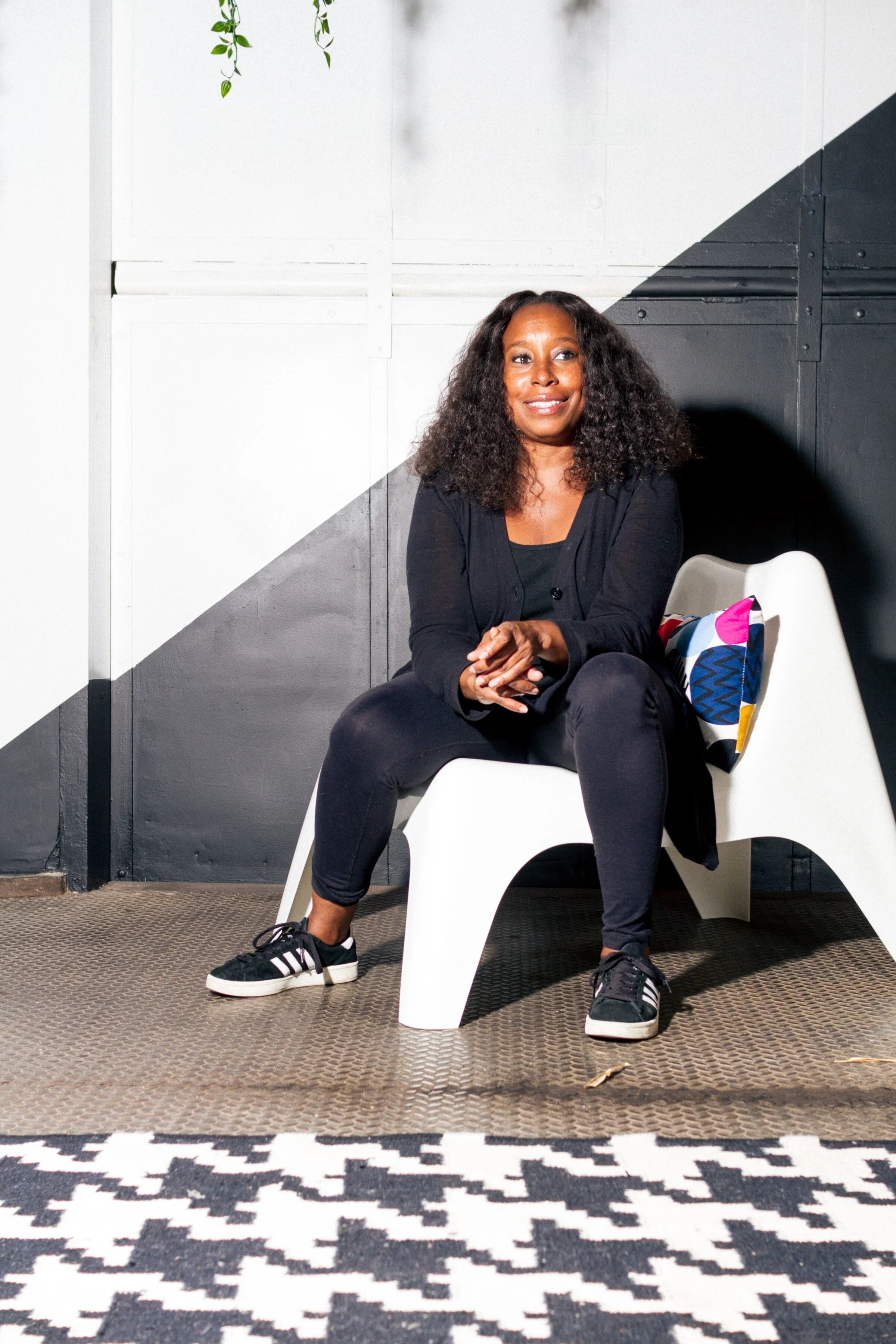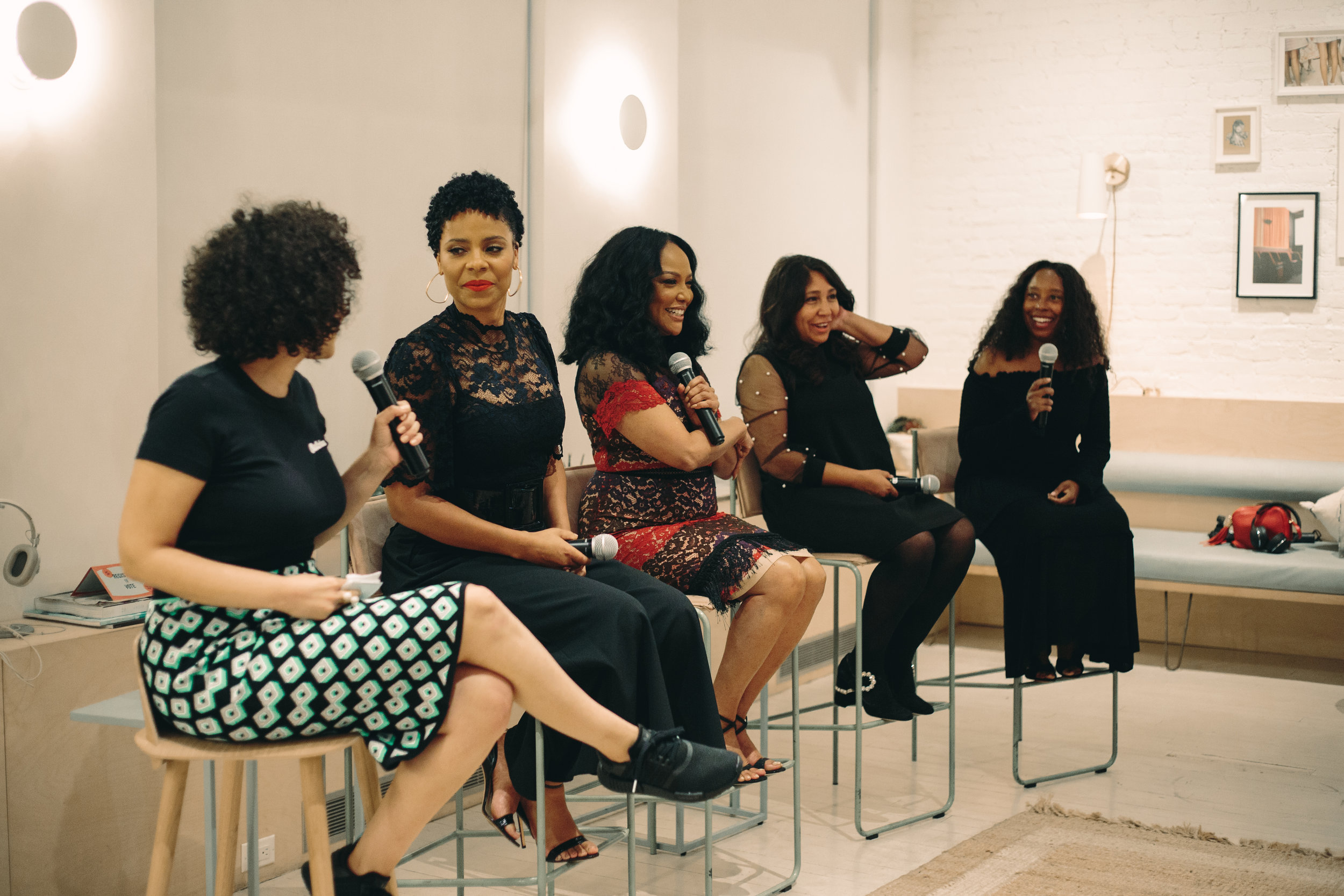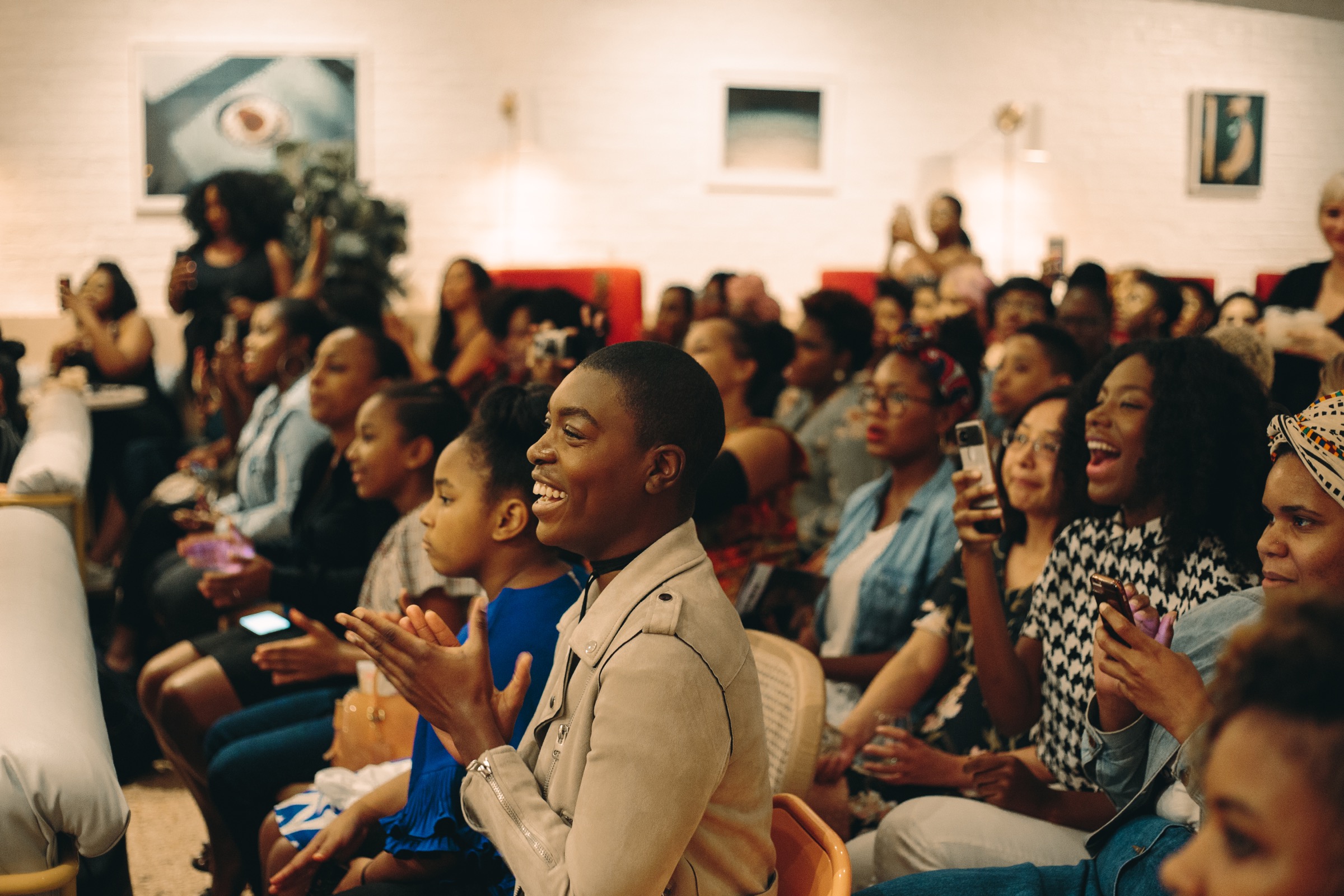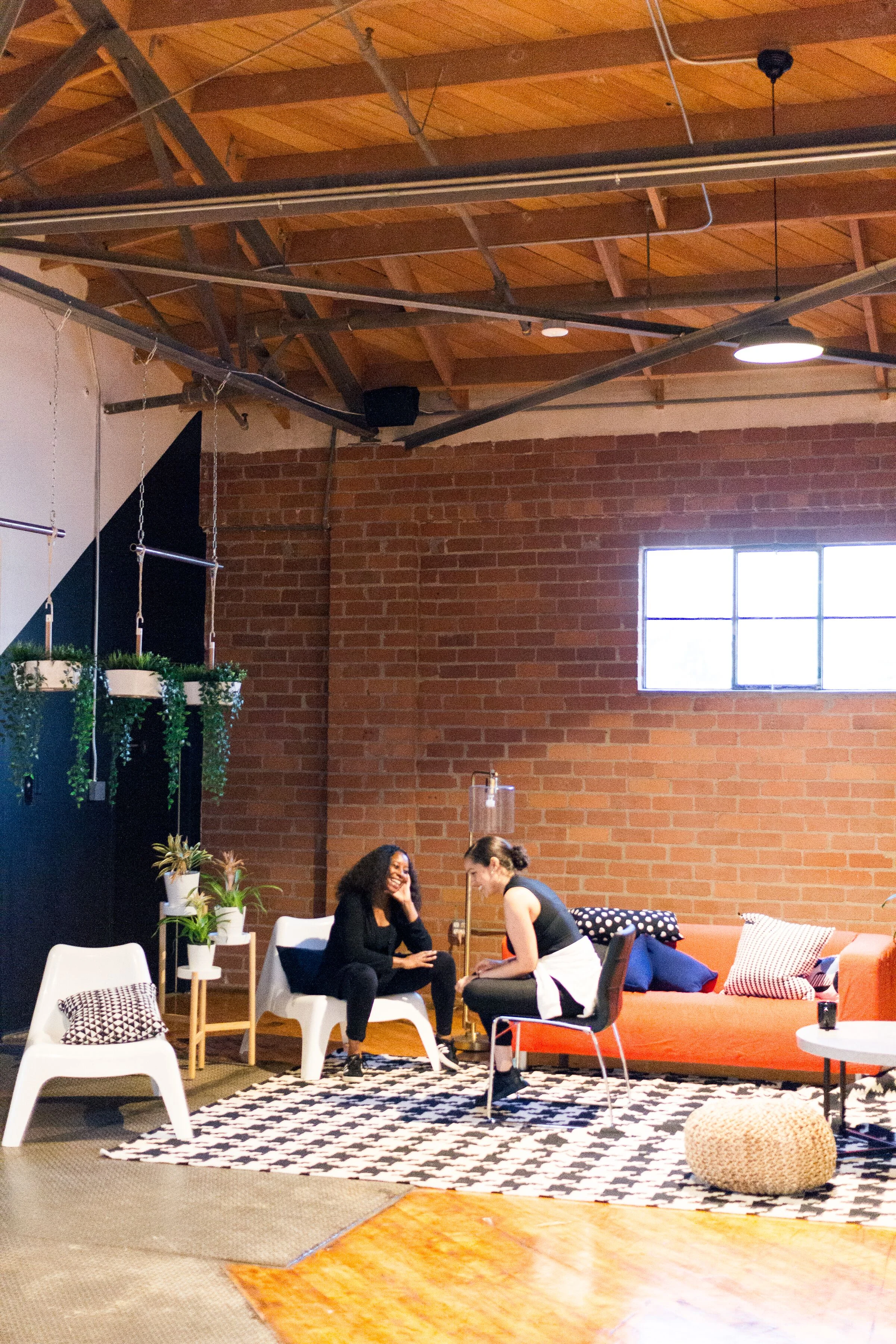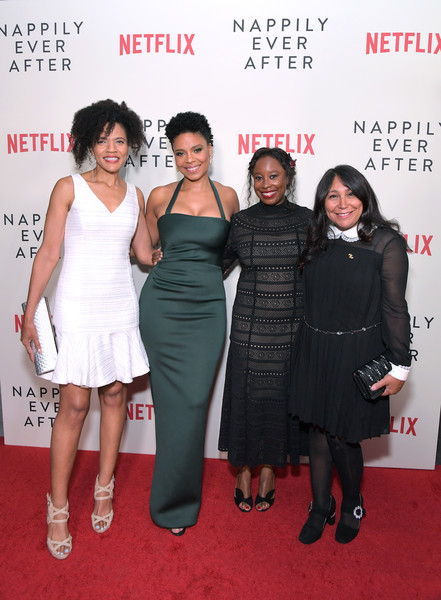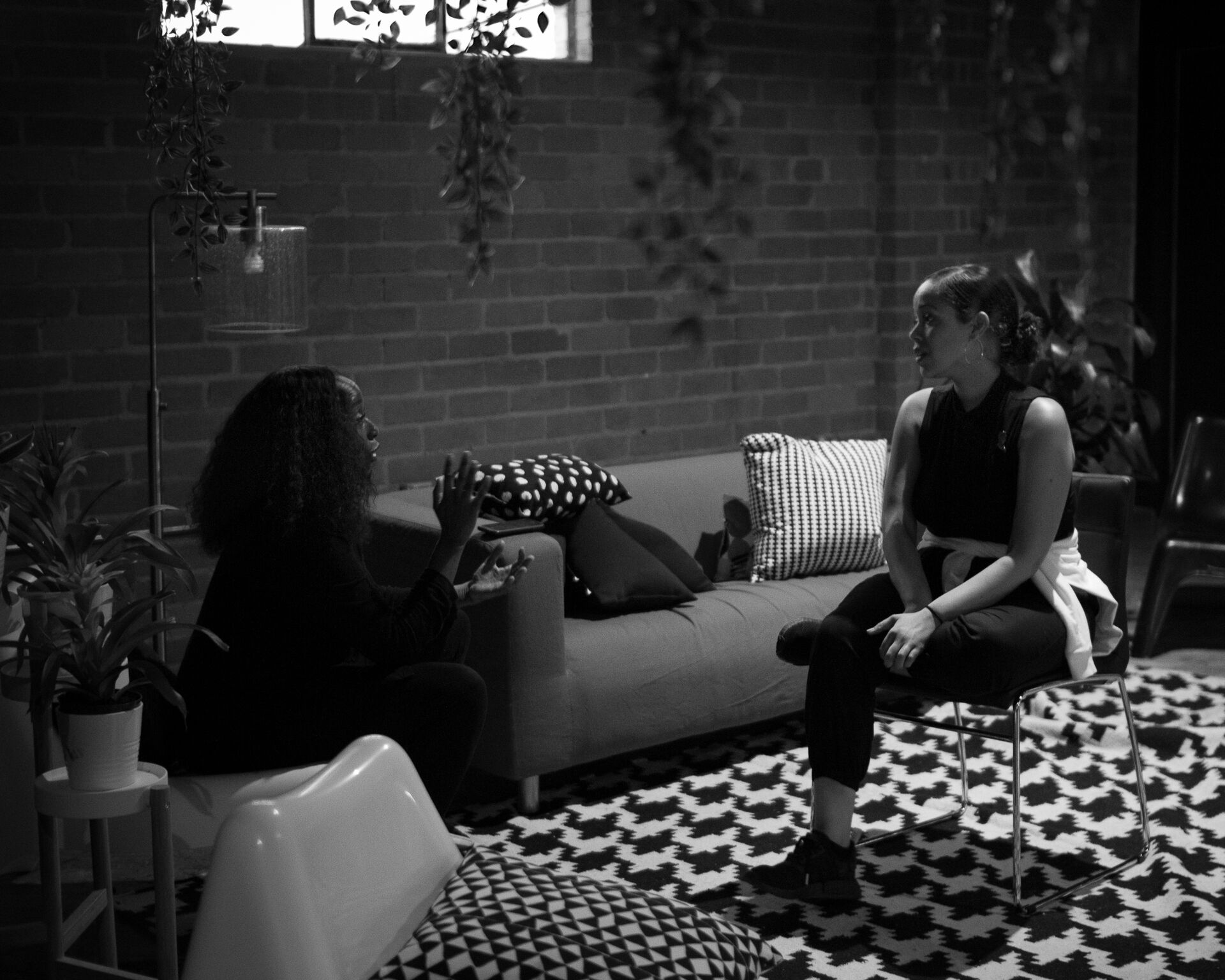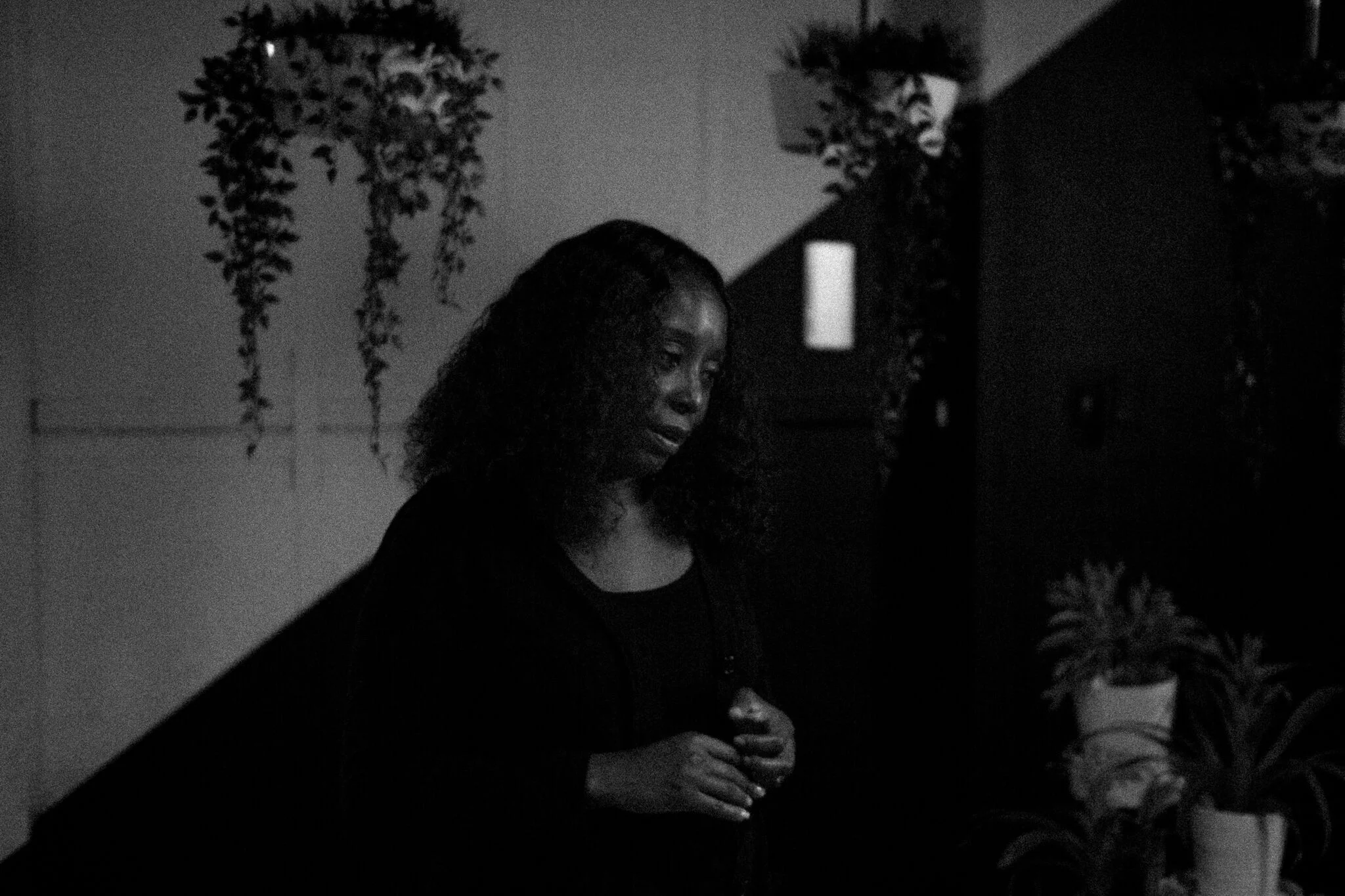A Conversation with Tracey Bing, Producer of Netflix's Nappily Ever After
At this point, it’s safe to say that every Black woman I know has seen Nappily Ever After on Netflix. Released in late September, the romantic comedy stars Sanaa Lathan as Violet and co-stars Lynn Whitfield as her overbearing (albeit stylish) mother, Pauletta, who is obsessed with Violet’s every detail (read: her hair).
Directed by Saudi Arabia’s first female filmmaker, Haifaa al-Mansour, the movie was adapted from Trisha Thomas’ 2001 novel of the same name; and has since been championed into existence in large part by producer Tracey Bing, who first read the script way back in 2005.
Panel discussion with cast & crew at CRWN’s advanced screening in NYC, September 17th.
Left to right: Lindsey Day, Sanaa Lathan, Lynn Whitfield, Haifaa al-Mansour, Tracey Bing.
Photography: Goblin.
I had the chance to learn more about the film’s origin — among other things — at our advanced screening at The Wing in NYC; and of course jumped at the chance to catch up with Tracey, a native New Yorker, on the West Coast later that week.
After celebrating the film’s official LA premier the night before, Nkrumah and I invited Tracey to Vector 90, a new coworking space in South Central LA; to snap some portraits and learn more about Nappily Ever After, Tracey’s career as a producer and her vision for the future.
Lindsey: The film is out on Netflix today!! Major congratulations are in order. [During our panel] on Monday you mentioned you’ve been trying to get this movie made for 13 years??
Tracey: The script was sent to me in 2005 when I was an executive at Warner Independent Pictures. We didn’t make the movie then, as the budget was much higher than our $15 million cap. Then five years ago, eOne Features (Molly’s Game, Spotflight) asked my company Badabing Pictures to put together a slate of films geared towards African American audiences that I would produce. The first film that came to mind for our slate was Nappily Ever After. And that was five years ago. So, the last five years was the most recent push to bring this story to screen. There were setbacks, and false starts (eOne shuttered its US theatrical business and allowed me to set it up elsewhere -- Netflix) but together with my fellow producers Marc Platt and Jared LeBoff, I was committed to getting it made. The script stayed with me since 2005 because of my own personal experiences and issues with my hair throughout my life.
LD: I mean, you heard the room [during our advanced screening], everyone in there. You really hit those touch points. The sitting with your mom and getting your hair hot combed, sitting on the stoop and getting your hair braided...you see these moments of trying to comb your hair and you’re just like, Fuck it, I’m done.
I wanna have that moment still, just shave it all off. I feel like I’m gearing up toward it.
The audience at CRWN Presents: Nappily Ever After advanced screening at The Wing SoHo, September 17th.
Photography: Goblin.
L: I’m getting shorter and shorter with each cut. I really wanna chop it off!
I kinda want to too, but I think I’d do the shave.
L: You think you’d shave it all the way? Girl, you’re braver than me.
I want to start over, honestly. I need to start over, like from when I was a kid. So I can get my hair back. Somehow I feel like if I cut it off, it’s still… I need to get rid of it all. A fresh start. But I’m scared. I got a pea head [laughs].
L: Oh my gosh, that is not true. You’d be so cute!! [laughs] Let’s not even talk about my head shape... So earlier you told me you’re a New Yorker, from Harlem by way of the Bronx.
143rd and Convent.
Nkrumah: That’s a beautiful neighborhood.
I grew up in this huge brownstone from the late 1800s, and it was just me, my mom and my dad. I had a floor for myself. And the block I grew up on...all the kids were friends, all the parents were friends, we’d take trips together. It was a great community. I’m still so close to all the kids on the block and all of the parents.
Lindsey: The real Harlem… Are all the people still there?
Everybody’s pretty much still there.
L: That’s cool, ‘cause I know Harlem has changed so much — there’s a Whole Foods on 125th now… How does it feel when you’re back?
It’s kind of surreal; my Dad envisioned all the recent change, 40 years ago! But I love that everyone I grew up with is still there. Lana Turner is like this New York socialite. I grew up with her, she’s a second mother to me. She is a ballroom dance aficionado, and she wears these funky/glamorous/unique hats all the time — she’s really cool. Like, she’ll be in the New York Times Style Section for her hats -- or check out the hat she wore at Aretha’s memorial! When I was a kid my mom used to braid my hair all the time. So that’s kind of like in [Nappily Ever After] where she’s braiding Zoe’s hair on the stoop. I always hated those braids. These twists, I used to call them doo doo braids. And I hated them. Then there’s that scene in the movie with the Barbie doll, it’s very much inspired by this photo of me as a child (at Lionel Hampton’s house!) playing with a white Barbie doll. At the time we were so influenced by European standards of beauty.
L: Because that’s all you saw.
Right. It’s all we saw — advertising, images… I keep thinking God, my life would be so different if I’d had some Black dolls. With real Black hair, not just like Black Barbie hair. Like Black Barbie had straight hair that was just brown instead of blonde.
L: And the face was exactly the same, just brown instead of white. With the same features or whatever… Yeah, I mean, my mom was adamant. Like, any kind of Black doll we saw, she was getting it for me. I know that influenced me in major ways, just on a subconscious level like, you’re Black, you’re in America…
Also I went to a private school in New York. So most of my classmates were white, so they also all had straight hair. So I always felt like, you know, I look so different than everybody. When I was really little I thought I was a cute kid. Then I think as I got older I didn’t think I was very pretty.
L: —as happens to a lot of young girls.
It just changed. I see these photos of myself with my hair natural and I look so carefree, or a photograph of when I’m seventeen months old and I’m jumping into a lake in Florida, and I’m just so free. I wish I could recapture that. I’m trying to now. I loved swimming. If not for my hair, I think I could have been an Olympic swimmer!
L: So tell me more about your career. You said you came out here [to LA] in 2001, with Paramount. Were you in production even at that time?
Yeah, I was Director of Acquisitions and Co-Productions. So I had worked in New York before that for six years, in indie film. For a bunch of Miramax films, actually, which was good training ground, films like Flirting with Disaster and The Pallbearer. I worked for this producer who developed Gridlocked (Tupac Shakur’s last film), and another film called The Yards. So I did all of that, and I made a movie that went to Sundance in 1998. And I made a documentary about Haiti with Jonathan Demme (Philadelphia, Rachel Getting Married), a really amazing filmmaker who recently passed away. And then I went to business school after that, and I knew I wanted to move to LA after business school.
L: Where’d you go to business school?
I went to Harvard.
Left: Tracey Bing left; Right: Lindsey Day. Pictured at Vector 90 in LA.
Photography: Nkrumah Farrar.
L: I just casually went to business school at Harvard [laughs]. So humble!
I guess I should own it [laughs]! Anyway, so I moved out here after business school and I got a job at Paramount. This HBS Alumni Frank Biondi introduced me to Sherry Lansing, who said, “Your experience is perfect for Paramount Classics, our art house division.” So, I went and I did that, and from there I started the art house division at Warner Bros. I bought this movie called March of the Penguins, which I then hired Morgan [Freeman] to do the narration. I changed it -- cut five minutes out, got a new script written, a new score, and so it sort of became this very different movie than the French version that we originally bought. Then I worked on this movie, Before Sunset which starred Julie Delpy and Ethan Hawke.
L: I’m about to go on your IMDB and get my life.
I was a studio exec, so we never got credit back then. But that was what prepared me [to executive produce] Southside With You. Southside to me was like Before Sunset but with Barack and Michelle walking around instead of Ethan and Julie. So that’s why that film was something I really wanted to make. I’m trying to do things that are different, but commercial. I don’t think we ever get to see Black love portrayed like that with such simplicity and beauty. And with Nappily, it was the whole idea of self acceptance and self-love which is something I struggle with personally. It is a romantic comedy about falling in love with yourself. We never see that. So I feel like that was a story I really wanted to tell.
L: I mean, I haven’t seen anything like it on screen anywhere, ever.
I was happy with how it came out. I don’t think in my wildest dreams it would’ve come out this good. When we originally thought about who was gonna play this role, and we went to Sanaa, she was our first choice because she has a strength about her. There’s a fearlessness. And you know, there’s comedic moments but she’s got a lot of depth to her as well. And we knew she could go on the emotional journey that Violet undergoes. So that’s what really attracted us.
L: She went all the way there with it.
She went all the way there. We did talk about it [during the conversation on Monday], she was like, “Can I wear a bald cap?” and all this stuff. We were like, It’s not gonna work. It won’t be authentic.
L: So wait, when she did that scene, is that her hair?
That’s her hair.
L: So she bleached it and did the whole thing?
So before, we had to figure it out — it’s all very choreographed. We decided we would shave her hair on day five, which meant we had to dye her natural hair blonde, but she did wear that blonde wig in that one scene. But then when it rained, it becomes her hair. And it’s her hair that she shaves off.
Sanaa Lathan, pre-big chop, in Nappily Ever After. Photo courtesy of Netflix.
L: I can’t even imagine. How scary to do it on camera. To do it and have to act through it, I don’t know many people who could pull that off. And if you mess it up, it’s done.
No more chances. And I think she picked up a razor just to see how to use it, and then we rolled the cameras and just went for it.
L: Sometimes there’s a bit of mystery when it comes to the “industry.” People see “Producer” and “Director” but don’t really know what the roles entail. And clearly you went to business school, you approach this as a business, and you’re a business-minded woman. What does producing a film look like from your perspective?
The thing with producing, I think the best way to look at it is like you’re the CEO of a film. So you’re in charge of overseeing creative, financial, marketing and distribution, casting, and talent relations from inception to production to post-production to delivery. On the film side, the producer is really important in terms of determining what stories get told, because we’re typically the ones who originate the material, option it, and fall in love with it like I did with Nappily, hire writers, develop/shape the material, and then once you have a script attach a star. Then you attach the director and the rest of the cast, and negotiate all their deals. You hire the cinematographer, production designer, costume designer in consultation with the director which determines what’s the film going to look like. You’re on set all the time. You’re making sure everything is going smoothly, troubleshooting. You’re just really involved in every single decision, which is great. And then you oversee post production -- the edit process, any special effects, the music and delivery to the studio. It’s really fun.
L: What does that mean?
So, the Director’s Guild provides a certain number of weeks for the director to put together their cut, then the producers get to refine that further. And then you are intricately involved with the selection of the music in the film from hiring our fantastic composer Lesley Barber (Manchester By the Sea) to the amazing needle drops spearheaded by our phenomenal music supervisor Kier Lehman (Insecure) including two original songs sung by PJ and Eryn Allen Kane. So you’re really involved from the inception of the idea until post-production, until you deliver to the studio. And even then you’re involved with the poster and the creative decisions, and so it’s very cool.
LA premiere of Nappily Ever After.
Left to right: Trisha Thomas (author of Nappily Ever After); Sanaa Lathan, Tracey Bing, Haifaa al-Mansour.
Photography: Charley Gallay.
L: That is so cool. To be like, “I love this book,” and then to manifest that vision. What does it feel like, sitting there yesterday [at the official premier of Nappily Ever After in Hollywood]?
Last night was amazing. ‘Cause it felt like, Oh my God, all this hard work. It’s paid off. We’ve made a film that resonates for others as the script originally did for me. Like I said, for me I got the script in 2005. Marc Platt and Halle Berry developed the first versions of the script in the early years.
L: So she was involved at the script level?
She was, so she actually purchased the rights to the book in 2001. And then she brought the project to Marc Platt whose deal is at Universal. Universal then paid for a number of scripts -- there’ve been about 6 writers in the project’s history -- and it just never happened there. But she was the one who was first like, “I really want to tell this story.”
L: I knew she was involved, but I didn’t realize she was so deeply involved.
She was initially gonna play Violet. But, over time she wasn’t attached anymore, and the project was at Universal just dormant. So you know, it took a lot of energy to get it out of turnaround, two years to get all the rights.
L: What’s involved with that — whatever you can say — getting the rights? What does that entail?
Well, we had to get Halle’s rights. So we had to come up with a deal that made sense for her. She had the book rights. But then we also had to extend those rights, because her rights were ending, so we had to make a new deal with Trisha Thomas, the writer of the book. And then Universal owned all those scripts so we had to make a deal with them. And they had spent a lot of money on the various writers along the way. Marc Platt was instrumental in that process. And then we had to make a deal with Marc who had developed it early on. So it was just very involved and complicated with a number of parties.
L: A labor of love, for real. You really wanted this thing to come to life.
I really did. I really, really did.
L: I wonder why it wasn’t able to work in the past. Was it just timing?
I think it was timing. When I originally got the script, it was way too expensive for our division at Warner Bros. We were doing films that were under $15 million. And the film was developed as a star vehicle for Halle Berry at a studio with a much higher budget. And for whatever reason, no one wanted to jump into the movie at that budget level at that time. We reconfigured it all these years later as an independent film, outside of the studio system. Movies get financed based on their potential audience, assuming the minimum, and this film was looked at as a film geared towards African American audiences — similarly budgeted to other “niche” films. A film like Hidden Figures was financed based on a broader audience. And a film like Moonlight, based on the arthouse audience. Lucky for us, Nappily has performed well, beyond the target audience, with audiences around the world in places like South Africa, UK, France, Brazil, Mexico, Spain, Germany discovering the film thanks to Netflix which is exciting. This would not have happened with a traditional theatrical model. And it proves our stories do travel. Sadly it’s true, but at the time it seems it was just too much for an African-American targeted movie.
L: That was gonna be my next question...
I think that was really what happened, people just didn’t want to spend that kind of money.
L: And do you feel like that is shifting at all in the industry?
I do feel like things are shifting. It appears we are in a moment where there is more diversity in the industry; however, there is still a long way to go. Demand still outstrips supply for African-American films. But there are fewer outlets for these films. Several companies like Relativity and BroadGreen are no longer around, and other companies have cut back on the number of films they are making. That said, Netflix is stepping up in a major way.
There’s a real opportunity — African-Americans are a smaller percentage of the population, but we go to the movies more often. We support our films. There is an appetite for diverse and inclusive content. And the great thing to note is the diversity in terms of types of films we are making now, previously things were more restricted and formulaic. Now we have Black Panther, Girls Trip, Moonlight, Hidden Figures, Twelve Years A Slave, Mudbound. This is primarily because the talent pool has grown and filmmakers like Ryan Coogler, Ava DuVernay, Steve McQueen, Justin Simien, Dee Rees and Barry Jenkins have come up through the independent world and are making their mark. And then they are being co-opted by studios. It’s important to note that even now, studios aren’t typically taking chances on new talent, they have to prove themselves in the indie space first.
So I think it was a budget issue way back when. People weighing the cost versus the target audience. Studios now have realized the need and commercial sense for films targeted at African-American audiences. We are underserved. So there’s a real resurgence of content. The most important thing is keeping the quality level up. While we made the film independently, we still needed a decent amount of money to make the film you saw. We wanted to make something beautiful.
Tracey Bing & Lindsey Day at Vector 90.
Photography: Nkrumah Farrar
Nkrumah: Quality. We deserve quality.
Lindsey: In your experience, having been in LA for the last seventeen years, do you feel like it’s getting a little easier? Are people more receptive?
People are looking for more diverse content. We are in a great moment right now. And I want to take advantage of it. I think it's a great moment for Black producers, directors, writers, actors, we need to make the most of this moment as it will affect future generations. It’s definitely different.
Nkrumah: I am interested to know about what the culture is like in your industry?
The culture is terrible in our industry. I’ve had terrible experiences at both studios that I’ve worked at, really. Especially as a Black woman — at Paramount, I can think of two really bad situations that happened to me where I was traveling, because you travel for work. One time I was pushed and called “little nigger” at Cannes.
Another time I wasn’t allowed to go into my house at Sundance because they were like, “You don’t live here. We have a list.” And I was like “No, I’m staying here.” I was coming back from a midnight screening, it was 2am. I was like, “You’re gonna wake up everybody in my house, and my boss is a real crazy lady [laughs]. Like, please don’t wake her up. It’s gonna be a disaster.” They’re like “No, you don’t live here.” So I literally at one point just ran up the hill, put the key in the door, and they saw that it worked. They were rent a cops and they just drove away. And then I called the real cops and I said, these guys detained me and I want their names. And it became this huge issue. I had Robert Redford calling me and apologizing. So it did become this big deal, and Paramount was nowhere to be found to help me when this was going on. And then even worse, I got called into an office before I was about to go to the Venice Film Festival, and they said to me, “We just wanna make sure there’s gonna be no international incident when we’re traveling this time around.” And I was like, Like that’s my fault?
Lindsey: I don’t know why the industry is so aligned with being nasty and tearing people down. Who wants to exist in that?
It’s also like that in film in terms of between us. And maybe it’s this idea that there’s only a certain amount of us—
Nkrumah: Fighting over scraps.
Exactly.
N: So let me ask you this: given the culture in your business, how viable is independence? Talk about the role of Black entrepreneurs, Black filmmakers.
Obviously it’s like a “grass is greener” kind of thing, where I love the stability of being in a studio job, but I feel like being independent is the way of the future. Especially now that people are demanding diverse content. I mean, Charles King has put together a great company, Macro, they’re doing great films. And I think it gives you more ability to choose the projects you’re involved in, and to really love them. I remember being at Warner Brothers, they kept saying, “We wanna do diverse movies.” And I kept bringing them project after project, and they kept saying it but then they wouldn’t do it. Actions speak louder than words.
So I think if I can figure out how to stay independent, I will definitely do that. And I’ve been doing it for a long time now.
Tracey Bing at Vector 90. Photography: Nkrumah Farrar.
Lindsey: About how long?
Since 2006. Actually 2007.
L: That’s no small feat. Dominant culture is obsessed with celebrity, but we’re incredibly interested in learning about the business people, the people behind the scenes; the people bringing projects to life, that are producing this work. In entertainment, I think it’s important for our kids to aspire to be the producers and the makers versus just the actors. Being an actor is a great idea for some people. Everybody wants to be famous, but—
—they should see what all the other roles are. Lynn [Whitfield] and I went to the BAFTA tea for the Emmys last week, and I didn’t realize BAFTA is a foundation. And I was talking to this woman there and she was like, “We never have people of color come speak to students.” --they actually sponsor a school around here called the George Washington school? A prep school. And I guess they have all these filmmakers that come and talk to the students, just to tell them about different things you can do in film and they basically roll the credits and say these are how many jobs there are in film.
You don’t have to just be the star you can be the gaffer, or the grip, or the producer; so I was like I wanna get involved with this school. At least start by coming and talking to the kids about what I do, and maybe show them a few clips from the movie — I think our movie’s maybe too racy to show in full but...clips. So I think that’s super exciting, to show kids, especially around here because they’re right here. They could do so many things.

